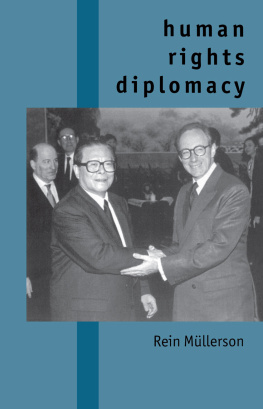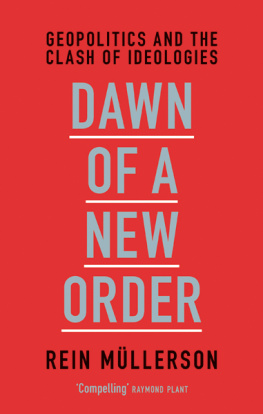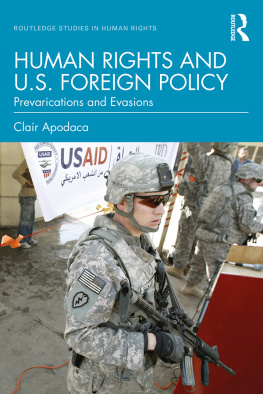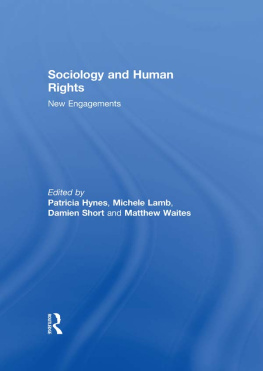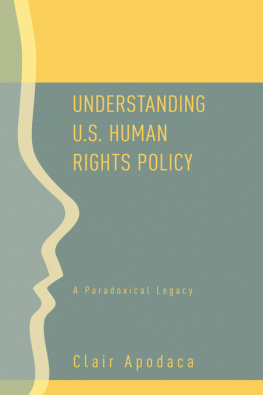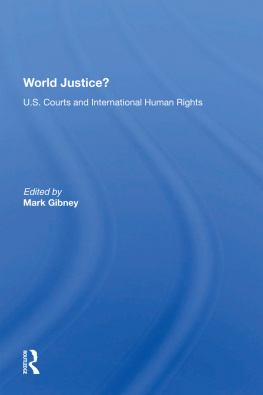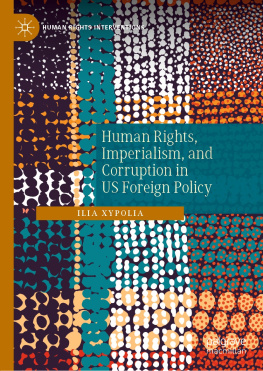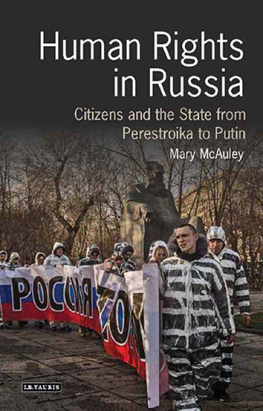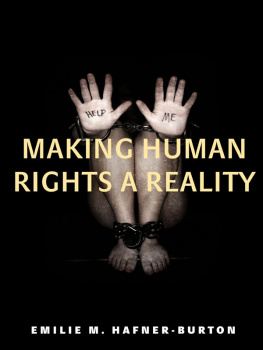Human Rights Diplomacy
In this insightful analysis of human rights diplomacy, Rein Mllerson examines the ways in which foreign policy instruments are used to promote human rights abroad, and how human rights issues are used for the sake of other foreign policy aims.
The book explores the relationship between human rights and international stability and the role of non-governmental organizations, the business community and mass media in formulating human rights agendas for governments and inter-governmental organizations. Also addressed are issues such as the universality of human rights in a multicultural world and the impact of religious and nationalistic extremism. Rein Mlillerson concludes by looking at the role of the UN and other international bodies engaged in the promotion of human rights, and how military force can be an option in settling violations.
The author argues that it tends to be regimes that are hostile to human rights that in turn cause instability in the international community. Throughout the book it is demonstrated that a concern for human rights is legitimate because of the impact human rights have on international relations, and because of the common bonds that link all people.
Rein Mllerson is Professor and Chair of International Law at Kings College, London. In 1995 he was elected to the Institut de Droit International. He is also the author of International Law, Rights and Politics (1994).
Human Rights Diplomacy
Rein Mllerson
First published 1997 by Routledge
Published 2014 by Routledge
2 Park Square, Milton Park, Abingdon, Oxon OX14 4RN
Simultaneously published in the USA and Canada
by Routledge
711 Third Avenue, New York, NY, 10017, USA
Routledge is an imprint of the Taylor & Francis Group, an informa business
1997 Rein Mllerson
Typeset in Times by Routledge
All rights reserved. No part of this book may be reprinted or reproduced or utilized in any form or by any electronic, mechanical, or other means, now known or hereafter invented, including photocopying and recording, or in any information storage or retrieval system, without permission in writing from the publishers.
British Library Cataloguing in Publication Data
A catalogue record for this book is available from the British Library
Library of Congress Cataloguing in Publication Data
Mullerson, R. A.
Human rights diplomacy / Rein Mllerson.
Includes bibliographical references and index.
1. Human rights. 2. Diplomacy. 3. International relations.
I. Title.
JC571.M899 1996
323dc20
9226289
CIP
ISBN 13: 978-0-415-15390-4 (hbk)
ISBN 13: 978-0-415-15391-1 (pbk)
Contents
The idea and the beginning for this book came from the International Institute for Strategic Studies (IISS) where I was a Research Fellow (non-resident) in 199495. The director of the IISS, John Chipman, and the Deputy Director, Rose Gottemoeller, as well as Dr Mats Berdal and many others who participated in numerous discussions on the manuscript, or parts of it, helped me immensely. My special thanks go to Dr Gerry Segal, who read the whole manuscript several times and whose comments were invaluable. Professor James Crawford of Cambridge University provided critical remarks of great help. I am also thankful to those anonymous reviewers who made many interesting comments and drew my attention to issues I had originally neglected.
Cairo Robbs critical eye and mind helped me to improve the content and form of the manuscript. It is, moreover, always a pleasure to work with Routledge staff. Gordon Smith, Caroline Wintersgill, Philip Gooch and James Whiting have helped me in every possible way.
George, Jan and Irina once more heroically withstood all the inconveniences related to my work on the book.
Rein Mllerson
Kings College, London
The end of the Cold War and the bipolar international system forces us to reconsider many of the traditional issues of international law and politics. The role of human rights in international relations and in the foreign policy of different governments is one of them.
Although human rights mainly concern relations between the individual and the state, they have become, especially since the Second World War, an important international issue as well. There are hundreds of legally binding human rights instruments which either cover a wide range of human rights, like the two United Nations Covenants on human rights, or deal with specific rights (e.g., labour rights in the International Labour Organizations conventions, or cultural and educational rights in UNESCO instruments). Some documents aim to protect or promote the rights of special categories of persons, such as the Convention on the Right of the Child or instruments on womens rights. Some instruments are universal, while others are of regional character.
As a starting point for our discussion on human rights in international relations and foreign policy I rely basically on those human rights instruments which are accepted by an overwhelming majority of states. These states represent all levels of economic, political and societal development, various cultures and religions of the world.
In
This book tries to analyse the reasons for and consequences of such an internationalization of human rights. Therefore, the emphasis is not so much on human rights as such but on human rights diplomacy, its determinants, objectives and future perspectives. Human rights diplomacy can be defined as the use of foreign policy instruments in order to promote human rights, as well as the use of human rights issues for the sake of other foreign policy aims. Human rights diplomacy may be closely related to, but does not exactly overlap with, humanitarian diplomacy. The latter is used by many states and non-governmental bodies in order to ease human suffering, which may be either man-made or caused by natural disasters such as droughts or earthquakes. Though in some cases it may be difficult to distinguish between human rights diplomacy and humanitarian diplomacy, the latter is always an emergency policy while the former is aimed at changing laws and practices, which means that long-term approaches are usually needed.
Though human rights issues have become a permanent component of the diplomacy of practically every state, they seldom rank high among political priorities. Policy-makers think more in terms of political hardware than software. When Joseph Stalin was told that the Pope had great influence in worldly affairs, Uncle Joes ironical response was completely in line with the tenets of Realpolitik: how many divisions does the Pope have? For the great leader of all of the working people of the world, only divisions mattered, and in this he was not unique. However, the end of the Cold War and the collapse of the Soviet Union has shown clearly that, though divisions do matter, there are other important factors, other issues which have to be called strategic, besides the balance of power, nuclear deterrence and the number of divisions and tanks. The Cold War itself was ultimately not about the bomb, it was more about ideas, including the idea of human dignity, and the idea of the rights and freedoms of human beings. The outcome of this struggle shows that, ultimately, ideas may be even more important than the number of divisions, missiles or nuclear warheads.
This does not mean to say that divisions or missiles do not matter. They certainly matter, if only because in order to have something in the long run it is often necessary to guarantee the immediate future. What I am trying to suggest, however, is that human rights issues in international relations are often either neglected or mishandled, with disastrous consequences, not only for human rights themselves, but also for the so-called hard or strategic problems of international relations; and that soft issues such as human rights and democracy may have serious implications for international peace and national security.

